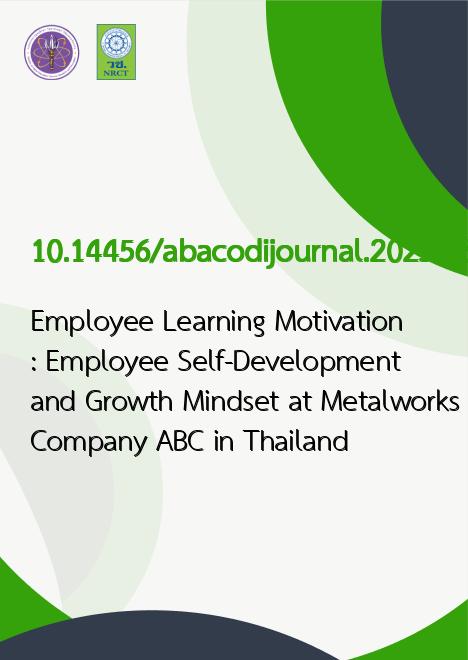
|
Employee Learning Motivation: Employee Self-Development and Growth Mindset at Metalworks Company ABC in Thailand |
|---|---|
| รหัสดีโอไอ | |
| Creator | Sumontha Tonvongval |
| Title | Employee Learning Motivation: Employee Self-Development and Growth Mindset at Metalworks Company ABC in Thailand |
| Contributor | Shun Lei Lei Naing, Natpatch Lasutham |
| Publisher | Graduate School of Business and Advanced Technology Management - Assumption University Thailand |
| Publication Year | 2568 |
| Journal Title | ABAC ODI Journal Vision. Action. Outcome |
| Journal Vol. | 13 |
| Journal No. | 2 |
| Page no. | 97-119 |
| Keyword | Growth Mindset, Motivation, Empowering Environment, Supportive Learning Culture, Self-Efficacy, Employee Self-Development |
| URL Website | https://assumptionjournal.au.edu/index.php/odijournal/index |
| Website title | ABAC ODI Journal Vision. Action.Outcome |
| ISSN | 2408-2058 |
| Abstract | Employee self-development is essential for an organization to grow and remain competitive. Employee self-development refers to the proactive behaviour of employees to engage in activities outside of business formalities to improve work-related expertise and skills. Employee learning motivation would be a key driver for employees to acquire new knowledge and skills to employ. This is crucial for both individual and organizational success. The aim of this study is to explore the relationship between growth mindset, motivation, empowering environment, supportive learning culture, self-efficacy, and employee self-development. The study also presents insights about them from the perceptions of employees at a metalworks company in Thailand. This study aims to contribute to the understanding of factors that foster self-development among industrial organizations in Thailand. This study investigates how growth mindset, motivation, and other psychological and environmental factors influence employee self-development at a Thai metalworks company. These data and insights then provide strategic recommendations. This study is a mixed-method study. The quantitative and qualitative data were collected via an online questionnaire. The quantitative data was analyzed using descriptive analysis and Spearman correlation. Content analysis was used to produce final themes for the qualitative data. The sample size of the study is 52 employees. The descriptive analysis showed that growth mindset has the highest mean score of 4.53 (N=52) and employee self-development has the lowest mean score of 4.18 out of all the factors. The results from Spearman correlation showed that self-efficacy has the highest significant positive correlation with employee self-development at = 0.63 (p <0.05). This is followed by Empowering Environment (= 0.62), Motivation (= 0.59), Supportive Learning Culture (= 0.52), and lastly Growth Mindset (= 0.45), which all had significant positive relationships. The final themes of the qualitative results include: value for personal self-development, rewards and personal fulfillment as motivators, the need for training on new tools and equipment and language skills, achieving targets and recommendations as sources of confidence and self-efficacy, and learning and development opportunities, training and development, and autonomy as some of the most prominent factors to promote employee self-development. The findings inform practical, sustainable strategies to foster a growth-oriented and self-motivated workforce within the company. |